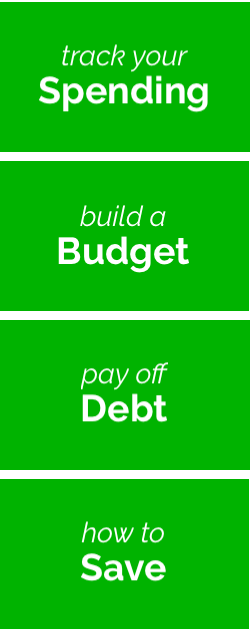What Is An Emergency Fund?
Plus 5 Examples Of Why Do You Need One!
Remember when you were a kid and you didn’t have a care in the world? No responsibilities, nothing to worry about, nothing to stress over. Well you can get that feeling again, or close to it, by having an emergency fund.
An emergency fund, or “e-fund”, is amazing! An emergency fund is like a big financial blanket. It helps you stay warm and cozy during a rough financial storm.
You can also think of an emergency fund like a seat belt. Most of the time it’s just there doing nothing… but when an emergency happens your e-fund jumps into action to prevent serious financial harm.
An emergency fund is a pile of money you keep tucked away in a safe place in case of a financial emergency. Your pile of emergency savings should be equivalent to 3-6 months of living expenses, but it can be much smaller to start.
Emergency funds can be smaller if you have high interest debt (which should be a priority), or if you have a strong safety net (ie. parents, friends, relatives that can help provide support or help reduce expenses in an emergency).
Building an emergency fund takes time. It’s something you should contribute to regularly with each paycheck.
Emergencies happen from time to time so your budget should include monthly savings to replenish your e-fund.
To be honest, e-funds are boring. An emergency fund should be invested in a high-interest savings account earning 1-2% interest. This protects the principal but it can also feel very boring. In this case though, boring is good. Boring means that your money will definitely be there when you need it most.
It can be tempting to invest your emergency fund in the stock market, DON’T DO THIS! Losing half your e-fund during a recession kind of defeats the purpose because this is probably the time you need an e-fund the most.
E-funds help you feel good. They help protect you. Having an emergency fund takes a lot of pressure off your finances. You can breathe a little easier knowing that you have a little bit of money tucked away in case of emergency. You can stress a little less because you’ve got a little buffer ‘just in case’.
In case you need more convincing, here are 6 real life examples of why you need an emergency fund…
You paid the wrong credit card or bill…
Seriously, have you never done this before? It happens to people all the time. If you use more than one credit card it’s easier than you think to pay the wrong credit card.
If you accidentally make a large payment to the wrong credit card or online bill payment you can always get that money back, but it takes a little while. In the mean time an e-fund can really come in handy to close the gap in your cash flow.
Car breaks down or you get in an accident…
Cars can be money pits. As a rule, the more assets you own the more you need an emergency fund. Car owners need extra money in their emergency fund to help cover unexpected repair bills or insurance deductibles. The more cars you own the larger your emergency fund should be.
A car accident can easily cost you $500 in deductible plus the time & money to arrange repairs and pay for a rental car.
Pro Tip: It’s always a good idea to set aside money for car repairs separately from your emergency fund. Car repairs are inevitable and you should budget for them monthly. Use this handy guide to help you figure out how much to set aside each month.
Household repairs…
Home owners face a higher risk of an unexpected repair bill. If you’re a renter then you can breathe easy because the landlord will take car of repairs, but for home owners you’ll need extra money available to cover unexpected repair bills.
It could be a new roof, a leak in the basement, or maybe you need $1,000 to cover the deductible on your home insurance. Home owners should have extra money in their emergency fund to help buffer against unexpected repairs.
Pro Tip: Just like car repairs, it’s always a good idea to set aside money for home repairs separately from your emergency fund. Home repairs are inevitable and you should budget for them monthly. Use this handy guide to help you figure out how much to set aside each month.
Job loss…
Unexpected layoffs happen. Work environments can become toxic. Sometimes you can find yourself quickly out of work and your emergency fund is there to save the day.
Having 3-6 months of living expenses in your emergency fund can greatly reduce the stress of a job loss.
Losing a regular paycheck is always stressful, but its awesome to know that you have a few months of breathing room tucked away in a savings account.
Bank error NOT in your favor…
It doesn’t happen often but banks do make mistakes. A mistaken withdrawal, double withdrawal, or even outright fraud can leave your checking account without enough money to pay your monthly bills.
Having an emergency fund can help fill the gap while the bank figures out where your money has gone.
Getting your checking account back to the right level can take 10 or more business days as the bank figures out what happened. An emergency fund takes away a lot of stress during these types of financial disasters.
Your phone shatters into a million pieces…
Your phone slips out of your hand and hits the pavement hard. You hope for the best but you’re pretty sure you heard glass shatter. Getting a phone repaired can be super expensive. Buying a new one outright is even worse.
It’s hard to even go 5-minutes without a phone and this is where an emergency fund can really come in handy. Rather than charging the repair bill to your credit card you can use you emergency fund to cover the cost of a new phone. Then instead of making interest payments on your credit card you can use that money to replenish your e-fund.
Why You Need An Emergency Fund
Everyone needs an emergency fund, whether you’re just starting out or well into retirement. Having an emergency fund helps you feel good. It provides peace of mind. Having an emergency fund takes the pressure off your finances.
An emergency fund can help avoid things like high-interest debt, which can be difficult to get away from.
With an emergency fund you can breathe a little easier knowing that you have a bit of money tucked away in case of emergency. You can stress a little less because you’ve got a little cash buffer ‘just in case’.
Join over 250,000 people reading PlanEasy.ca each year. New blog posts weekly!
Tax planning, benefit optimization, budgeting, family planning, retirement planning and more...
Join over 250,000 people reading PlanEasy.ca each year. New blog posts weekly!
Tax planning, benefit optimization, budgeting, family planning, retirement planning and more...






As a self-employed freelancer who recently lost a source of income, I can’t vouch for the importance of emergency fund enough. It’s literally the difference between “meh, it sucks but the next few months will be fine if we’re careful” and “OMG! I can’t pay the mortgage!”
Great example! Having variable income makes an emergency fund even more useful.